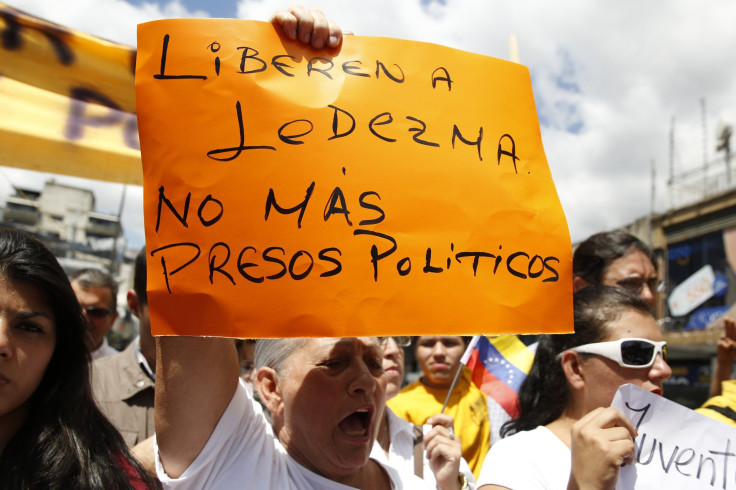Venezuela Arrest Sparks Fears Of Fresh Crackdown On Opposition

The Venezuelan government’s sudden, high-profile arrest of Caracas Mayor Antonio Ledezma is firing up the country’s political opposition, which condemned the move as an attempt to quash voices of dissent. Opposition supporters took to the streets in Caracas Friday to decry the arrest of Ledezma, an outspoken critic of President Nicolas Maduro. Observers say the arrest could signal a new, aggressive phase of crackdowns on political opponents, adding another combustible element to a nation already rife with tensions over its flailing economy.
Federal intelligence agents wielding guns forcibly removed Ledezma from his office Thursday evening and detained him, according to local witnesses. Maduro announced the mayor would face charges for allegedly conspiring to overthrow the government.
“Venezuela has been on a knife’s edge for some time, and [Thursday’s] action seems to suggest that a major line has been crossed,” said Michael McCarthy, a research fellow with the Center for Latin American and Latino Studies at American University in Washington.
Ledezma’s arrest “smells of desperation on the part of the government,” McCarthy said, adding that the Maduro administration was likely looking for a boogeyman to distract the public from the country’s myriad problems.
Venezuela’s economy, already suffering from inflation of more than 60 percent and a persistent shortage of foreign currency, has taken a dive in recent months because of the plunge in global crude-oil prices. The situation has exacerbated the frequent shortages of food and household items in supermarkets, forcing Venezuelans to wait for hours in grocery lines. Meanwhile, Maduro’s approval rating has dropped to its lowest recorded level, at just 22 percent, according to figures released by the polling firm Datanalisis in January.
Despite the tensions, mass anti-government demonstrations in recent months haven’t taken on the scale or volatility of the protests that rocked Caracas and the western city of San Cristobal last year. Still, analysts say the situation is fragile enough that a violent spark could have potentially disastrous consequences. “The broader concern now for Venezuela is [making sure] that a street fight does not break out,” McCarthy said.
The Maduro administration has been roundly criticized for its treatment of other opposition leaders, including Leopoldo Lopez, who led the protest movement last year and marked his one-year anniversary in prison just this week, and Maria Corina Machado, who was expelled last year from the legislature and charged in December with conspiracy to overthrow the government.
But Ledezma’s arrest shocked observers for the forceful way it was carried out. Security footage showed images of several federal agents carrying large guns while searching the building for the mayor. Entering the office without an arrest warrant, the agents used hatchets to break through doors, and they hit the mayor before taking him away, witnesses said.
The arrest has prompted worry that the Maduro administration could soon move to target other opposition members, as well. Lilian Tintori, Lopez’s wife, told local media Friday evening that an arrest warrant had been issued for Machado.
The Maduro administration named Ledezma, Lopez and Machado as co-conspirators in a plot to overthrow the government and assassinate the president. As Venezuelans commemorated the one-year anniversary of the February 2014 mass protests last week, Maduro announced the government had foiled a coup plot in which members of the air force, with support from opposition leaders and the U.S., were planning to attack the presidential palace with a military jet. A day before Maduro’s announcement, Lopez, Ledezma and Machado released a document outlining a broad plan for Venezuela’s economic and political transition.
Government critics have argued the Maduro administration has not produced any evidence of the plot, and noted the president has made several similar accusations in the past without proof. American State Department representative Jen Psaki dismissed the claims in a statement Thursday, calling Maduro’s accusations against the U.S. “baseless and false.”
“The United States is not promoting unrest in Venezuela nor are we attempting to undermine Venezuela’s economy or its government,” Psaki said.
© Copyright IBTimes 2025. All rights reserved.




















